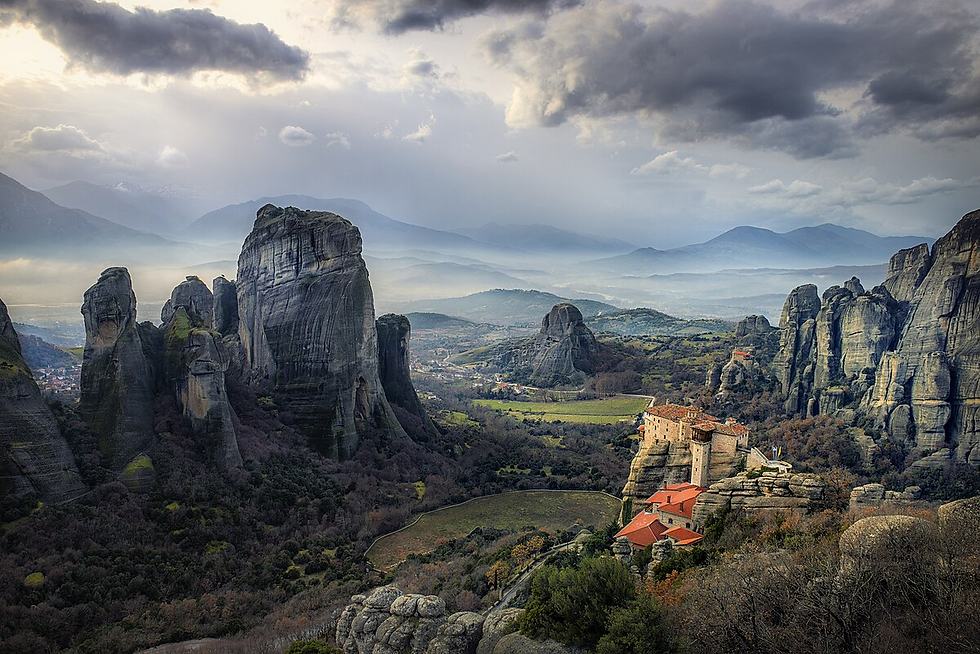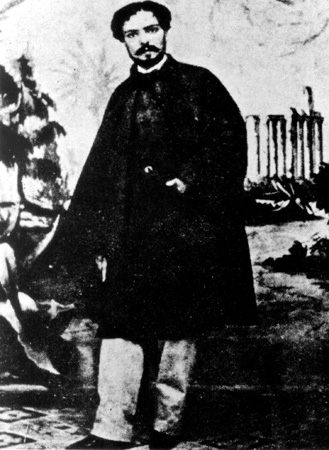Discover GREECE'S Rich Cultural Heritage
- culturalheritagesustainability

- 2 Eki 2025
- 5 dakikada okunur
Güncelleme tarihi: 31 Eki 2025
Greece, a country at the crossroads of Europe, Asia, and the Mediterranean, holds a rich cultural legacy shaped by thousands of years of history. From the ancient Acropolis and Delphi to the monasteries of Meteora and the cliffs of Santorini, Greece is a land where myth and history meet. Its philosophical and artistic heritage—from Homer to Socrates and Aristotle—continues to inspire the world.
Greek literature, from classical tragedies to modern voices like Nikos Kazantzakis, reflects the nation’s enduring spirit. Its cuisine—featuring olives, grilled meats, savory pies, and sweet desserts—celebrates Mediterranean tradition and flavor. Folk music, dances like the syrtaki, and centuries-old crafts reveal a culture both vibrant and proud.
With striking architecture and a timeless island lifestyle, Greece is a place where the past still breathes.Come, explore the beauty of
Greece’s cultural soul!
Athens

Athens, the capital of Greece, is a city where ancient history meets modern life. It is famous for the Acropolis, home to the iconic Parthenon temple. Athens offers vibrant neighborhoods, delicious food, and rich culture, making it a must-visit destination.
Delphi

Delphi is an ancient Greek site famous for the Oracle of Apollo, where people once sought divine guidance. It was considered the center of the world in Greek mythology. Visitors today can explore well-preserved ruins like the Temple of Apollo, an ancient theater, and a stadium. The site also hosted the Pythian Games, one of the precursors to the Olympic Games. Delphi was a major religious and cultural center in ancient Greece. Today, it remains a fascinating destination for history and mythology lovers.
Thessaloniki

Thessaloniki is Greece’s second-largest city, known for its rich history and vibrant culture. It features Byzantine churches, lively markets, and a beautiful waterfront. The city has a diverse heritage influenced by Roman, Ottoman, and Jewish cultures. Thessaloniki is a dynamic blend of ancient landmarks and modern life, offering something for every traveler.
Mykonos

Mykonos is one of the most famous Greek islands, known for its stunning beaches, white-washed houses, and vibrant nightlife. Located in the Cyclades, it attracts visitors from around the world who come to enjoy its beautiful views, luxury resorts, and iconic windmills.
Zakynthos

Zakynthos, also known as Zante, is a beautiful Greek island in the Ionian Sea. It is famous for the stunning Navagio (Shipwreck) Beach, crystal-clear waters, and sea turtles. The island offers a mix of natural beauty, relaxing beaches, and lively nightlife.
Meteora

Meteora is a unique destination in central Greece, known for its ancient monasteries built on top of towering rock pillars. It is a UNESCO World Heritage Site and offers breathtaking views, spiritual history, and a peaceful atmosphere. Meteora is perfect for both nature lovers and culture seekers.
Santorini

Santorini is one of the most iconic Greek islands, famous for its white-washed houses with blue domes, stunning sunsets, and volcanic landscape. Located in the Aegean Sea, it offers breathtaking views, romantic villages like Oia and Fira, and unique black sand beaches.
Greece Food Culture

Moussaka
Moussaka is a traditional Greek dish made with layers of eggplant, minced meat, and creamy béchamel sauce.
It is baked in the oven until golden and served hot as a hearty main course.
The dish is rich in flavor, often seasoned with cinnamon and herbs.

Souvlaki
Souvlaki is a popular Greek street food made of grilled meat on a skewer, usually pork or chicken.It is often served with pita bread, fresh vegetables, and tzatziki sauce.Souvlaki is flavorful, easy to eat, and perfect for a quick meal.

Tzatziki
Tzatziki is a traditional Greek dip made with yogurt, cucumber, garlic, and olive oil. It is served cold and often enjoyed with grilled meats or pita bread.
The dip is refreshing, creamy, and full of flavor. Tzatziki is a staple in Greek cuisine and a favorite in Mediterranean meals.

Dolmades
Dolmades are traditional Greek stuffed grape leaves filled with rice, herbs, and sometimes meat.
They are usually served cold with a drizzle of olive oil or lemon.
Dolmades are a popular appetizer in Greek and Mediterranean cuisine.
They are flavorful, healthy.

Galaktoboureko
Galaktoboureko is a traditional Greek dessert made with semolina custard wrapped in crispy filo pastry. After baking, it is soaked in a sweet syrup made of sugar, water, and lemon.
The dessert is rich, creamy, and has a delicious contrast of textures. Galaktoboureko is often enjoyed on special occasions and family gatherings.
Dionysios Solomos

Born: 8 April 1798, Zakynthos – Died: 9 February 1857, Corfu
About: Dionysios Solomos is considered Greece’s national poet. He wrote the famous poem “Hymn to Liberty”, which became the national anthem of both Greece and Cyprus. Educated in Italy, Solomos blended classical Greek ideals with the modern spirit of independence and identity. His works focus on freedom, moral strength, and the rebirth of Hellenism after centuries of Ottoman rule.
Constantine P. Cavafy

Born: 29 April 1863, Alexandria – Died: 29 April 1933, Alexandria
About: Cavafy, an Alexandrian Greek poet, is one of the most influential literary figures of modern Greece. His poetry is deeply reflective, exploring themes such as history, love, aging, and identity. Famous for “Ithaka”, his style combines Hellenistic imagery with introspection and irony. Cavafy’s concise yet philosophical voice made him a pioneer of modern Greek poetry, admired worldwide for his timeless humanism.
George Seferis

Born: 13 March 1900, Smyrna – Died: 20 September 1971, Athens
About: George Seferis was a poet and diplomat who became the first Greek Nobel Laureate in Literature (1963). His poems reflect exile, identity, and memory through a deeply personal and symbolic lens. Seferis’ language is simple yet musical, echoing ancient myths in a modern world. Through his diplomatic life, he embodied Greece’s struggle between tradition and modernity, making his voice central in 20th-century European literature.
Nikos Kazantzakis

GerBorn: 18 February 1883, Heraklion, Crete – Died: 26 October 1957, Freiburg, many
About: Kazantzakis was a novelist, philosopher, and playwright — one of Greece’s greatest modern authors. His novels “Zorba the Greek” and “The Last Temptation of Christ” explore the tension between spirit and flesh, freedom and faith. Influenced by Nietzsche and Bergson, Kazantzakis saw life as a passionate struggle for
transcendence. His works are deeply humanist, emphasizing courage and inner
liberation.
Nanos Valaoritis

Born: 5 July 1921, Lausanne – Died: 12 September 2019, Athens
About: A modern surrealist poet, novelist, and critic, Nanos Valaoritis was one of the most cosmopolitan Greek writers of the 20th century. Having lived in Paris, London, and San Francisco, he blended Greek mythology with avant-garde experimentation. Valaoritis was also a cultural bridge, introducing Greek literature to global audiences and teaching creative writing at Stanford University.
Andreas Kalvos

Born: 1792, Zakynthos – Died: 3 November 1869, Louth, England
About: Andreas Kalvos was a poet of the early Greek Romantic period and a strong advocate for freedom and national independence. His Odes (1824–1826) combine classical structure with passionate patriotic feeling. Influenced by European Romanticism, Kalvos helped bridge ancient ideals with the modern Greek identity emerging during the 19th century.
Emmanuel Rhoides

Born: 28 June 1836, Syros – Died: 7 January 1904, Athens
About: A witty and critical novelist, Emmanuel Rhoides gained fame for “The Papess Joanne” (1866), a satirical novel about a female pope. His sharp humor and skeptical attitude toward dogma made him a controversial figure in 19th-century Greece. Rhoides was also an essayist and translator who helped shape modern Greek prose through his refined and ironic style.





Yorumlar